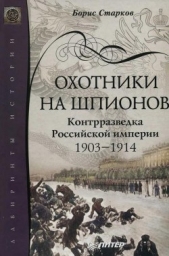Шпионы XX века

Шпионы XX века читать книгу онлайн
Неизвестные похождения известных асов шпионажа, новые для нас имена крупнейших шпионов (таких, как знаменитый писатель Сомерсет Моэм), оригинальные версии тайных операций (например, дела Пеньковского) – все это читатель найдет в книге английского публициста Филлипа Найтли, вышедшей в Великобритании под названием «Вторая древнейшая профессия». Книга мгновенно стала бестселлером, переведена во многих странах. Автору, пожалуй, впервые удалось объемно показать, насколько это возможно, систему и особенности деятельности ведущих спецслужб – СИС, ЦРУ, КГБ. При этом суждения Найтли отличаются своеобразием, далеко не всегда совпадают со взглядами других исследователей, а по манере изложения и вовсе оригинальны. Написанная увлекательно, местами иронично, книга читается с интересом не меньшим, чем хороший детективный роман.
Внимание! Книга может содержать контент только для совершеннолетних. Для несовершеннолетних чтение данного контента СТРОГО ЗАПРЕЩЕНО! Если в книге присутствует наличие пропаганды ЛГБТ и другого, запрещенного контента - просьба написать на почту [email protected] для удаления материала
Филлип Найтли
Март 1994 г.
Литература, источники
(1) Thomas W. Braden, 'Kirn Philby of Her Majesty's Secret Intelligence Service', Washington Post. 12 May 1968.
(1) PRO, CAB/16/8/ERE 9077.
(2) ibid., p. 3.
(3) PRO, WO/32/8873/ERE 9077.
(4) William Le Oueux, Things I Know about Kings, Celebrities and Crooks (London: Evelyn Nash & Grayson, 1923), p. 242.
(5) ibid., p. 251.
(6) William Le Queux, Spies of the Kaiser: Plotting the Downfall of England (London: Hurst & Blackett, 1909), p. xi.
(7) PRO. CAB/16/8/ERE 9077, Appendix I.
(8) PRO, CAB/16/8/ERE 9077, p. 10. Further quotations in this chapter come from this document, unless otherwise stated.
(9) PRO, CAB/16/8/ERE 9077, Secret Report and Proceedings.
(10) Slade Papers III, microfilm MRF 39/3, National Maritime Museum , Greenwich .
(11) Recounted by Nicholas P. Hiley, 'The Failure of British Espionage against Germany , 1907 – 1914', Historical Journal, vol. 26, no.4 (1976), pp. 867 – 89.
(12) The Times, 4 November 1911 .
(13) The Times, 29 October 1914 .
(14) Hiley, 'Failure of British Espionage', p. 887.
(15) Walther Nicolai, The German Secret Service (London: Stanley Paul, 1924), pp. 52 – 3.
(16) The statement was printed in The Times, 9 October 1914 .
(17) Hiley, 'Failure of British Espionage', p. 888.
(1) Skardon in interview with author, 1967.
(2) Nigel West, MI6. British Secret Intelligence Service Operations 1909 – 1945 (London: Weidenfeld & Nicolson, 1983), p. 7.
(3) Alley in interview with Page, Leitch and Knightley, 1967.
(4) 'The Profession of Intelligence', part I. ВВС Radio 4, 5 March 1980 .
(5) Nicolai, German Secret Service, p. 18.
(6) PRO, WO/106/45/ERE 9077, p. 15.
(7) Herbert von Bose, ' Verdun , Galizien, Somme , Isonzo… Oder Wo?', in Hans Henning Freiherr Grote (ed.), Vorsicht! Feind hort mit! (Berlin, Neufeld und Henius, 1930), pp. 73 – 4.
(8) R. J. Jeffreys-Jones, American Espionage (New York: The Free Press, 1977), p. 49.
(9) Fletcher Pratt, 'How Not to Run a Spy System', Harper's, September 1947, p. 243.
(10) William R. Corson, The Armies of Ignorance (New York: The Dial Press, 1977), pp. 591 – 2.
(11) See, for example. Henry Landau, The Enemy Within (New York: Putnam's, 1937).
(12) Nicolai, German Secret Service, p. 109.
(13) Corson, Armies of Ignorance, p. 65.
(14) S. T. Felstead, German Spies at Bay (London: Hutchinson, 1920), p. 20.
(15) PRO, WO/32/4898/ERE 9077.
(16) ibid., Minute sheet 12D, 8 November 1920 .
(17) ibid., Minute sheet 13, 12 November 1920 .
(18) ibid., Petition from Greite in Parkhurst Prison, 12 September 1921 .
(19) Felstead, German Spies, p. 135.
(20) W. H. H. Waters, Secret and Confidential (London: John Murray, 1926), p. 36.
(21) Ulrich Trumpener, 'War Premeditated?', Central European History, vol. 9, no. 1 (March 1976), p. 67.
(22) Army Quarterly, vol. 18, no. 2 (July 1929), p. 287.
(23) See Maurice Paleologue, 'Un prelude a 1'invasion de Belgique', Revue des deux mondes, vol. 11 (October 1932).
(24) Nicolai, German Secret Service, p. 186.
(25) See Patrick Beesly, Very Special Intelligence (London: Sphere, 1978), pp. 21 – 6.
(26) Sam Waagenaar, The Murder of Mata Hari (London: Barker, 1964), pp. 251 – 2
(27) ibid., p. 250.
(28) Letter from Major von Roepell to Major General Gempp, 24 November 1941 , in ND collection. Military Archives, Freiburg , West Germany .
(29) World's Pictorial News, 25 April 1926 , p. 3.
(30) Nicolai, German Secret Service, pp. 287 – 8.
(31) A. Swetschin, 'The Strategy', in Max Ronge (ed.), Kriegs und Industrie Spionage (Vienna: Amalthea, 1930), p. 86.
(1) 'The Profession of Intelligence', part 1, BBC Radio 4, 5 March 1980.
(2) House of Lords Record Office, Lloyd George MSS, F/9/2/16, 'Reduction of Estimates for Secret Services', 19 March 1920.
(3) Kerby in interview with Page, Leitch and Knightley, 1967.
(4) Lloyd George MSS, F/9/2/16, Churchill to Lloyd George, Bonar Law, First Lord of the Admiralty. Lord Curzon, and Chancellor of the Exchequer, 19 March 1920.
(5) Lloyd George MSS, F/9/2/16, 'Reduction of Estimates for Secret Services', p. 2(vii).
(6) 'The Profession of Intelligence', part 2, BBC Radio 4, 12 March 1980.
(7) Lloyd George MSS, F/33/2/3, Long to Lloyd George, 9 January 1919.
(8) Sidney Reilly, The Adventures of Sidney Reilly (London: Elkin Mathews & Marrot, 1931), pp. 28, 44.
(9) ibid., p. 43.
(10) ibid. Mrs Reilly tells her story in the second half of Reilly's unfinished book.
(11) ibid., p. 238.
(12) Quoted by Lewis Chester, Stephen Fay and Hugo Young, The Zinoviev Letter (London: Neinemann, 1967], p. 194.
(13) Christopher Andrew, 'The British Secret Service and Anglo-Soviet Relations in the 1920s'. Historical Journal, vol. 20, no. 3(1977). p. 705.
(14) Maugham's spell in Russia is best told in R. J. Jeffrey-Jones, American Espionage (New York: The Free Press, 1977), ch. 7.
(15) Paul Dukes, The Story of ST-25 (London: Cassell, 1938), pp. 32 – 3.
(16) ibid., p. 293.
(17) R. H. Bruce Lockhart, Memoirs of a Britich Agent (New York: Putnam's, 1932). p. 288.
(18) 'Russian Agent Planted on Sir R. Bruce Lockhart'. The Times, 14 March 1966.
(19) The Cheka plot is explained in Richard K. Debo, 'Lockhart Plot or Dzerzhinski Plot?', Journal of Modern History, vol. 43, no. 3 (1971), pp. 413 – 39.
(20) Kenneth Young, The Diaries of Sir Robert Bruce Lockhart: Vol 1. 1915 – 1938 (London: Macmillan, 1973).
(21) Respectively: Dukes in interview with Page, Leitch and Knightley, 1967; and George A. Hill. The Dreaded Hour (London: Cassell, 1936), p. 260.
(22) Andrew, 'Britich Secret Service', pp. 690 – 1.
(23) Lloyd George MSS, F/203/3/6, Folder 5, 'Memorandum on the Situation in Russia'.
(24) Bruce Page, David Leitch and Phillip Knightley, The Philhv Conspiracy (New York-Doubleday, 1968), p. 117.
(25) Lockhart, Memoirs, p. 341.
(26) Kirn Philby, My Silent War (London: MacGibbon & Kee, 1968), p. xv.
(1) Sir David Petrie, Communism in India , 1924 – 1927 (Calcutta: Editions Indian, 1972), pp.174 – 5.
(2) Page, Leitch and Knightley, Philby, p. 118.
(3) Cecil in interview with author, 1980.
(4) Nicholson in interview with author, 1967.
(5) There are many versions of the Ellis story. This one comes from an interview with one of Ellis's senior officers. The author will forward letters to him.
(6) Gwynne Kean, letter to author, 4 March 1980 .
(7) Interview with Page, Leitch and Knightley, 1967.
(8) 'The Profession of Intelligence', part 2, BBC Radio 4, 12 March 1980 .
(9) 'The Profession of Intelligence', part 2.
(10) Nicholson in interview with author, 1967.
(11) ibid.
12 John Whitwell, British Agent (London: Kimber, 1966), pp. 70 – 1.
(13) Christopher Andrew, 'Now Baldwin 's Secret Service Lost the Soviet Code', Observer, 13 August 1978 .
(14) Christopher Andrew, 'Governments and Secret Services: a Historical Perspective',
International Journal, vol. 34, no. 2(1979), p. 180.
(15) F. H. Hinsley el al., British Intelligence in the Second World War (London: HMSO, 1979), vol. 1, p. 56.
(16) Morton in interview with Page, Leitch and Knightley, 1967. Morton said that his network controller was 'The Times man in Rome '. The Times staff records list Coote as its correspondent there during the relevant period.























